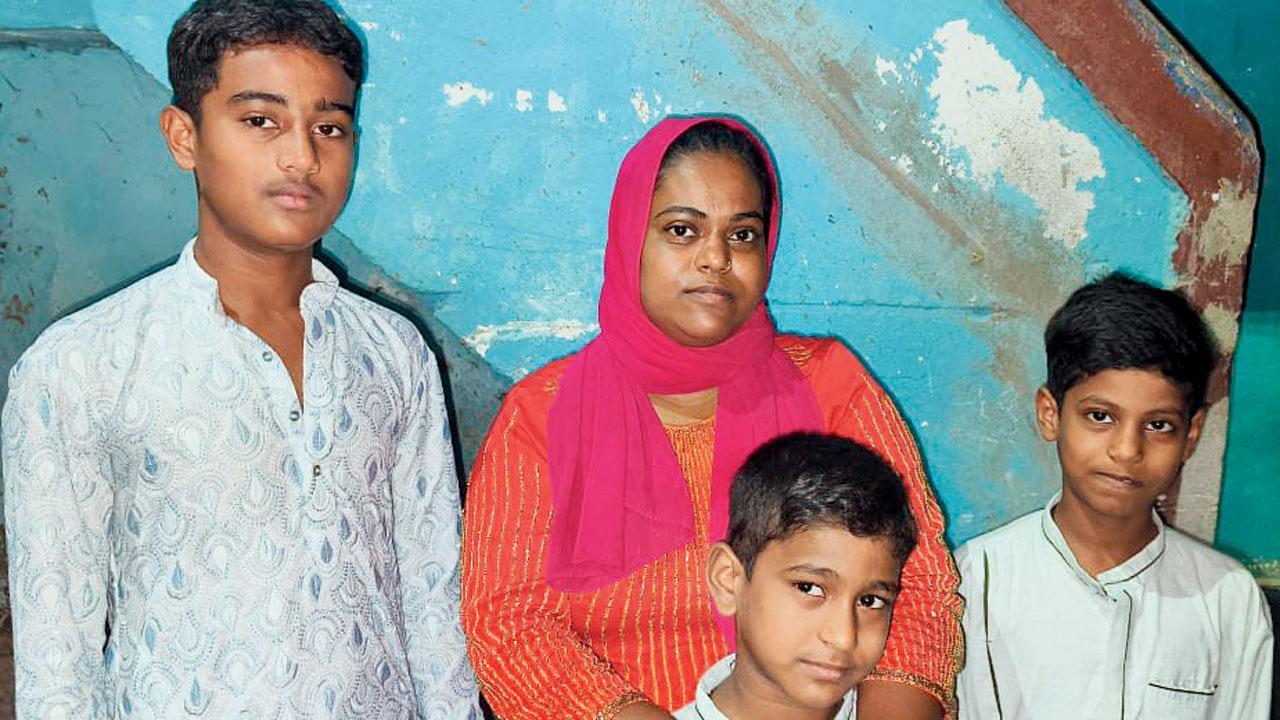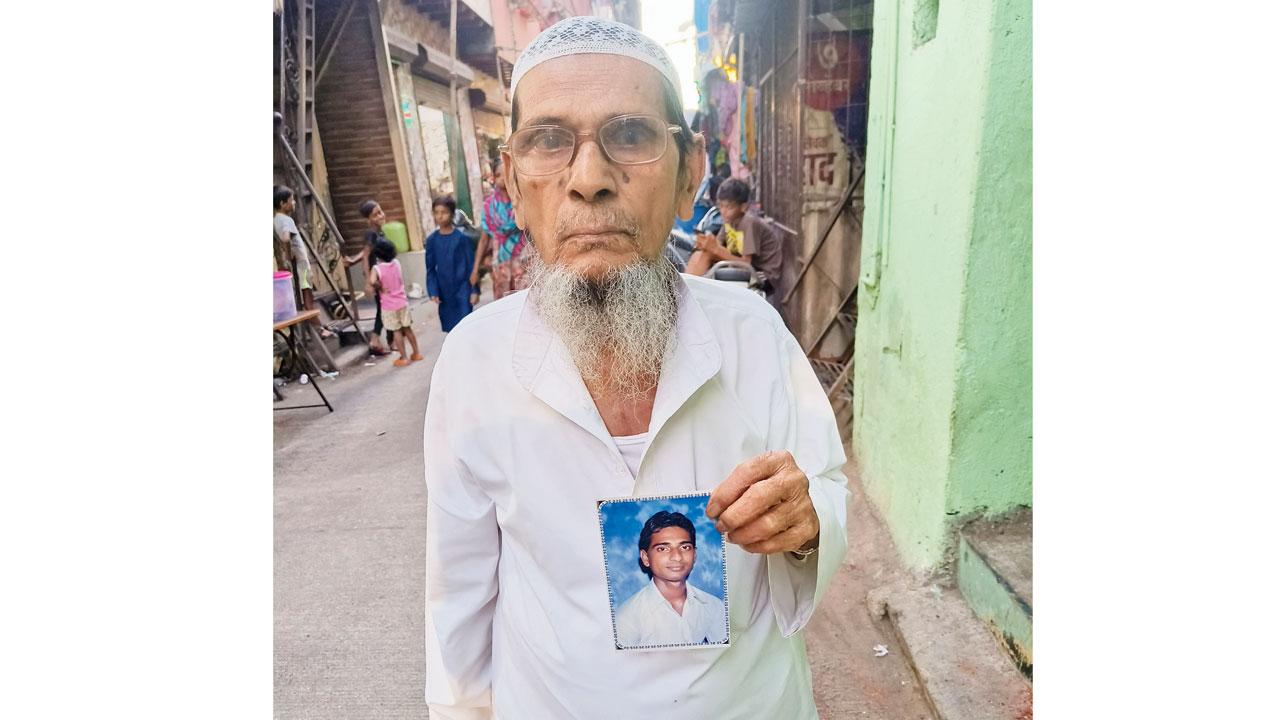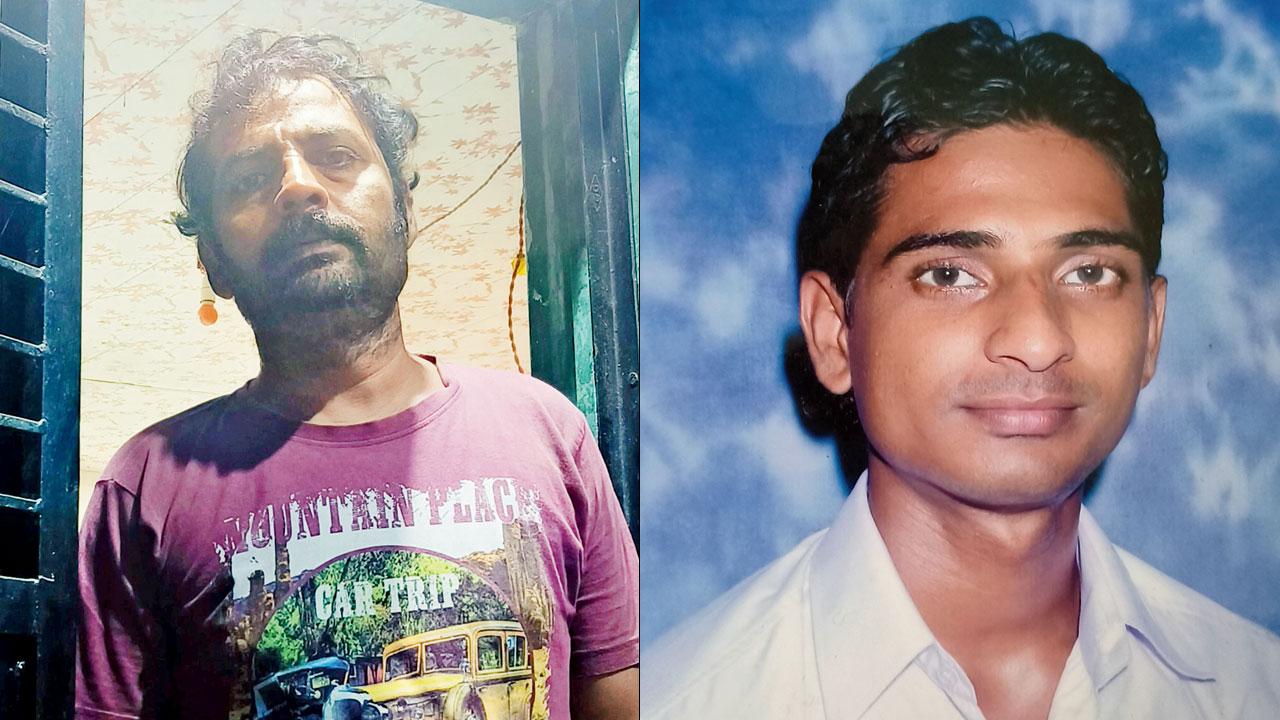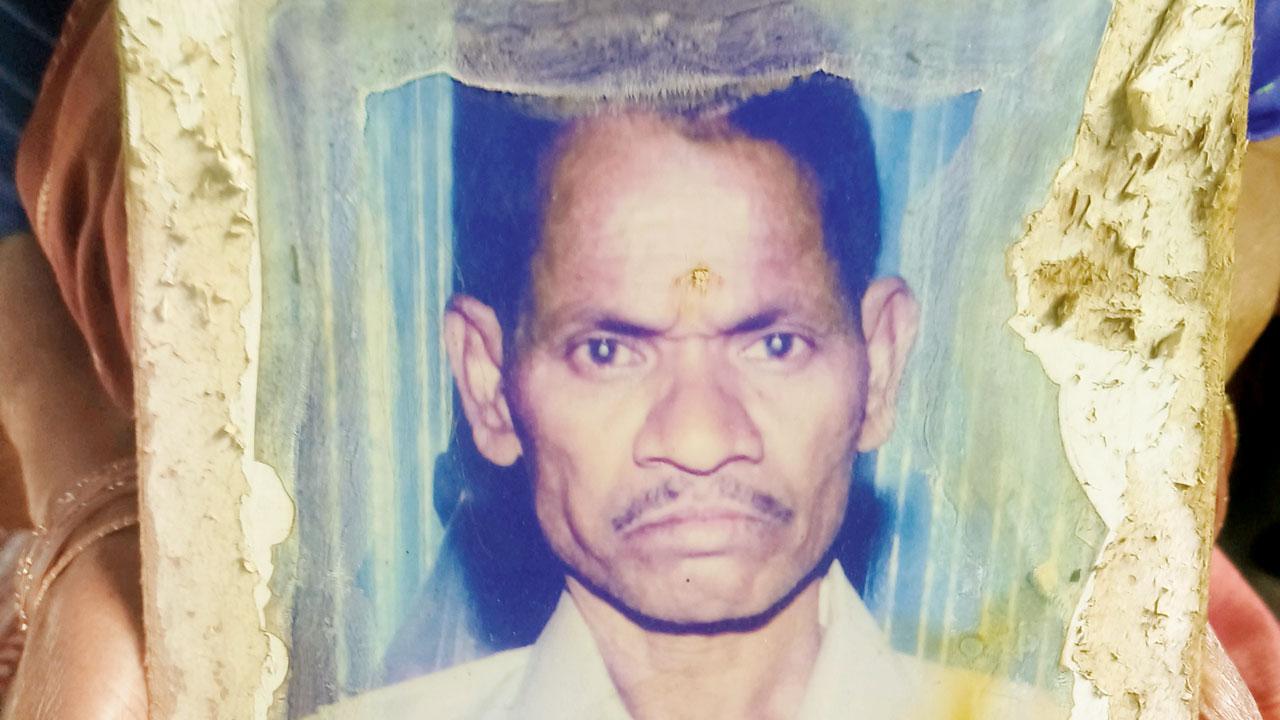Nine years on, families of Malwani hooch tragedy victims recount horrifying ordeals, seek justice

Azizur Rahman’s widow, Farhana B, and their children
Nine years after 106 residents of the slums of Malwani, Malad lost their lives after drinking spurious liquor, the families of the deceased told mid-day that haven’t been adequately compensated by the authorities and are struggling to make ends meet.
Farhana B, the widow of Azizur Rahman, who died at the age of 25 in 2015, said, “I received only R1 lakh in compensation. I am living with my three kids and in-laws and also working on a school bus. The value of poor people’s lives is just Rs 1 lakh.”
The sessions court on April 29 convicted four accused and acquitted around 10 people suspected of having played a role in the incident, which left 76 people permanently impaired. The quantum of punishment will be decided on May 6. Two accused are absconding. The court also penalised eight police officers for negligence.
He lost vision and died
Rahman, who worked as a salesman at a Churchgate-based shop, was declared dead after consuming alcohol mixed with methanol at a party. Rahman was living with Farhana B; their children Afnan, Faiq and Farhan; and his 75-year-old father Mushtaq.

Mushtaq, Azizur Rahman’s father
Farhana B said Rahman was not an alcoholic, but he would occasionally drink with his friends. “In 2015, he took leave to spend time with his family. One afternoon, his friends invited him to a party as one of them had secured a job. They went to the Kharodi area and purchased alcohol priced at R20 per packet. They started drinking in the afternoon. In the evening, after five to 10 minutes of coming home, he started vomiting and told me he could not see clearly. I rushed him to a local clinic where the doctor gave him two bottles of saline and later let him go.”
“Late at night, we received information that all his friends who had partied together had died due to alcohol poisoning. In the morning, he started vomiting again and lost his vision entirely. We rushed him to the clinic, where they advised us to take him to Shatabdi hospital. We took an auto and rushed him there, but after five to seven minutes of being admitted, doctors declared him dead. My husband walked into the hospital, and we received his dead body,” said Farhana.
Mushtaq said, “I was at the mosque when I heard my son was admitted to the clinic. He survived for one day, but on the second day, he died. Our entire family was dependent on him. He left behind three kids. The government gave us Rs 1 lakh in compensation. My son was not an alcoholic, but he drank while celebrating his friend’s achievement. The government does not value the lives of the poor. How will an entire family survive on just Rs 1 lakh for the rest of their lives?”
‘Toxic brew claimed his life’
Malwani resident Sharda Yadav recounted the last days of her husband, Mukund Bhikaji Yadav, a labourer who was 65 years old at the time of his passing. Like Farhana, Sharda received R1 lakh in compensation. She now does household jobs in the area to survive.

Imran Ali Abdul Gani Kazi at the house where accused Francis D’Mello allegedly infused alcohol with methanol; (right) Azizur Rahman, the salesperson who lost his life at the age of 25
Sharda said, “Mukund would drink and sleep after coming home in the evening. On that fateful day in 2015, he came home after purchasing a packet of alcohol for Rs 20, drank it and later had dinner. Five minutes after eating, he started vomiting and lost his vision. After he told me he couldn’t see anything, I sought help from the neighbours and rushed him to Shatabdi hospital.”
“A mere five minutes after he was admitted, doctors came out and told me he had died. I was shocked and broken. I pleaded with the doctors to save him, but they said he was dead. Five minutes later, they brought out his body and sent it for a post-mortem examination. Later, I found out that the alcohol was spurious. My husband was a daily drinker, but he lost his life because the hooch was toxic. The police are equally responsible because in many places in Malwani, such illegal alcohol is being made and sold. The police should crack down on these operations to save lives. I lost my husband, but I don’t want anyone else to lose their lives because of this menace,” Sharda said.
House of infamy
The house where the deadly hooch was mixed, in Inaswadi, Kharodi was sold for Rs 25 lakh to one Imran Ali Abdul Gani Kazi. However, the agent had allegedly concealed its connection to the tragedy while selling the flat.

Mukund Yadav, who died in 2015
Kazi, 43, told mid-day, “I recently purchased this flat for Rs 25 lakh from Francis D’Mello, one of the accused. The agent didn’t tell me anything about the history of this house. Had I known this information, I wouldn’t have purchased this house. The agent kept me in the dark. I feel sorry for the deceased and their families.”
According to the police, D’Mello had purchased and sold many plots in Malwani. He had allegedly been running the hooch operation from his home for many years. He always kept his doors shut and was never involved in activities in the society. Neighbours knew that he was selling local liquor at home, but later, when the police caught him, they found that he was using toxic chemicals to make it more potent.
Action taken so far
The incident came to light in 2015 after many people fell sick and were rushed to Shatabdi hospital after consuming spurious liquor. The Malwani police then registered an FIR and the case was handed over to the Crime Branch. According to the police, 14 accused were arrested for running an illegal distillery in Karodi Gav and supplying liquor infused with methanol.
The sessions court has convicted Mansoor Kahan for producing and supplying methanol-infused liquor to the hooch makers in Malwani. The police had proved the conspiracy charges against Kahan as they had recorded the statements of 21 witnesses in this matter.
Modi operandi
According to the police, they had arrested Kahan for procuring the chemical from Gujarat and then supplying it to other people. “Kahan used to approve the quality of chemicals and procure them from Gujarat. He then used to pass them onto other accused who would supply illicit liquor to various parts of Malwani,” said an officer. The accused used to target daily wage workers.
After Kahan supplied the chemical, the other accused Raju Tapase, Donald Patel and D’Mello used to distribute the illicit liquor. “Once Kahan used to approve the quality of the liquor, the trio used to pour it into polythene bags or water bottles and distribute them via bicycles in the nearby area,” said the police. The victims either lost their lives or faced kidney failure and other serious disabilities. Many people lost their sight due to drinking cheap and illicit liquor.
At least eight police officers, including the then senior police inspector of Malvani police station Prakash Patil, were suspended after the tragedy. When the FIR was lodged the police, booked the accused under Sections 304 (culpable homicide not amounting to murder), 308 (attempt to commit culpable homicide), 326 (voluntarily causing grievous hurt) of the Indian Penal Code and sections of the Bombay Prohibition Act, 1949.
April 29
Day sessions court convicted 4 accused
 Subscribe today by clicking the link and stay updated with the latest news!" Click here!
Subscribe today by clicking the link and stay updated with the latest news!" Click here!










